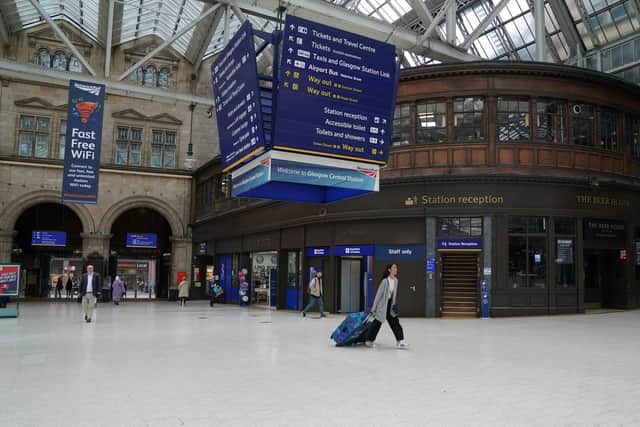Rail strikes 2022: Train passengers hit by more cancellations as strike talks resume
Services started later than normal today as trains were delayed leaving depots due to Network Rail (NR) signallers and control room staff who would usually have worked overnight shifts taking part in Tuesday’s strike.
In Scotland, ScotRail said while the large signalling centres at Yoker, West of Scotland and Edinburgh will be able to operate from 7.15am, this will not be the case at manual boxes elsewhere and it may well be early afternoon before many routes are able to operate as normal.
Advertisement
Hide AdAdvertisement
Hide AdSome routes, including the Dundee to Aberdeen and Dundee to Glasgow routes, will only see one train running today.


Disruption caused by Tuesday’s rail strikes will mean that “today is going to be quite a messy day”, for travellers, the independent watchdog for transport users has said.
Anthony Smith, the chief executive of Transport Focus, told BBC Radio 4’s Today programme: “Today is going to be quite a messy day still.
“Virtually all of the train companies have special timetables in place, services are starting up late and trains and staff are not in the right place.
“So please do not assume that this is a normal day.
“If you are going to travel by train check before you leave the house, check on the way to the station and, for goodness sake, bring a bottle of water with you.”
Just 60% of trains across the UK will run across the day as a whole, and some operators will wind down services slightly earlier than normal tonight ahead of Thursday’s walkouts.
The third strike of the week is planned for Saturday.
ScotRail said it is only able to run services on just five routes on strike days, which will only operate between 7.30am and 6.30pm.
But on the days in between, there will be continued disruption to services, the train operator warned.
Advertisement
Hide AdAdvertisement
Hide AdAround 40,000 members of the Rail, Maritime and Transport (RMT) union at Network Rail and 13 train operators are involved in the industrial action.
RMT members on London Underground also went on strike on Tuesday.
The joint action caused travel chaos across Britain, with journeys taking longer and roads rammed with traffic as people switched to cars or buses to get to work.
Strike-bound Glasgow Central Station quieter than lockdown – even most trains had vanished this time
The RMT will meet with NR and the train companies today in another attempt to break the deadlock.
RMT general secretary Mick Lynch said the turnout at picket lines on Tuesday was “fantastic” and had exceeded expectations in the union’s campaign for job security, defending conditions and a decent pay rise.
He said: “Our members will continue the campaign and have shown outstanding unity in the pursuit of a settlement to this dispute.
“RMT members are leading the way for all workers in this country who are sick and tired of having their pay and conditions slashed by a mixture of big business profits and Government policy.
“Now is the time to stand up and fight for every single railway worker in this dispute that we will win.”
Advertisement
Hide AdAdvertisement
Hide AdA Department for Transport spokesperson said: “These are desperately needed reforms that modernise the railway and put it on a sustainable footing for passengers and taxpayers.
“Unions have shut down big parts of the rail network, hitting local businesses and unfairly cutting people off from hospitals, schools and work.
“However, early data shows that unlike in the past, many people now have the opportunity to work from home, so we haven’t even a rush to the roads, as traffic has instead gone online, which means the unions aren’t having the overall impact they might have hoped.”
The union has been asked by Network Rail to attend formal consultation talks next month on introducing “modern working practices”.
Network Rail official Tim Shoveller said the changes will mean “dumping outdated working practices and introducing new technology”.
He added: “We expect this will reduce roles by around 1,800, the vast majority of which will be lost through voluntary severance and natural wastage.”
Most adults believe the rail strikes are justified, according to an opinion poll.
A survey of over 2,300 people by Savanta ComRes showed that 58% said the industrial action was justified.
Advertisement
Hide AdAdvertisement
Hide AdYounger adults aged 18-34 (72%) and Labour voters (79%) were more likely to see the strikes as justified compared to their older, aged 55 and above, (44%) and Conservative-voting (38%) counterparts.
Three out of five of those polled said they are generally supportive of the principle of industrial action, while just 35% were generally opposed.
Dominic Raab said the Government had to “hold the line” against the RMT’s demands for improved pay and conditions on the railways.
The Justice Secretary said the strikes were “deeply regrettable” and reform was necessary on the railways.
“We’ve, of course, got to reform the way the railways operate, given the new ways to working on the effect that has on commuter travel,” he told LBC Radio. “But there are also old practices, which frankly, are well out of date and unnecessary, which need to be reformed.”
He added: “I think Network Rail are taking the right approach. We know that the cost of living challenge is there, we know that it affects workers across the board.
“But the one thing that will keep inflation higher for longer and undermine pay packets for longer is if we have spiralling public sector pay increases beyond what is responsible. And that’s what’s at issue here.
“It is precisely to protect the wages of those on the lowest incomes that we need to hold the line.”
